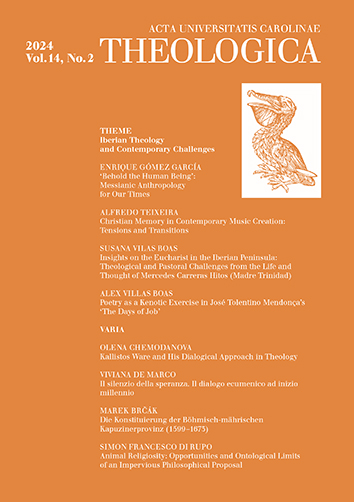AUC Theologica is a peer-reviewed journal for theology published twice a year. As we publish original papers in English, German, French, and Italian, our mission is to serve as a platform both for Czech researchers, who can present their research results in these languages, and for international contributors, who are invited to enter the academic theological discussion in the heart of Europe.
The journal focuses on a wide range of theological disciplines, such as systematic theology, biblical studies, patristic studies, pastoral and spiritual theology, religious education, church history, etc. Within these fields, the journal seeks to reflect the current theological questions and problems, which often requires interdisciplinary approaches. Supporting the intersection of various theological disciplines, we thus also welcome theological papers touching other academic fields including philosophy, sociology, literary studies, and science.
Each issue consists of two sections. The thematic section presents papers of the same focus. The section called ‘Varia’ invites papers dealing with various theological themes from the perspective of all Christian traditions. Our current and past issues are approachable for free on this website in the form of Open Access.
AUC THEOLOGICA, Vol 14 No 1 (2024), 57–79
Der Begriff der Angst und die Theologie
[The Concept of Fear and Theology]
Jakub Sirovátka, Reinhold Esterbauer, René W. Dausner
DOI: https://doi.org/10.14712/23363398.2024.6
published online: 01. 11. 2024
abstract
Fears have increased in recent years, both individually and collectively. Such fears about one’s own existence can be interpreted in different ways: psychologically, sociologically or politically, but also philosophically or theologically. The article deals with the phenomenon of fear/anxiety from three perspectives on the border of philosophy and theology. In 20th century philosophy, Martin Heidegger defined anxiety as the basic human mood in which man is brought before the nothingness of his existence and thus before himself. This situation of anxiety gives rise to the question of one’s own authentic existence. Heidegger’s theory has become an essential theory of anxiety, not only within phenomenology, and has significantly influenced further discussion. Emmanuel Levinas reacted to Heidegger with frontal criticism. He placed anxiety in an ethical context and thus gave the term a new meaning. The article presents and contrasts both approaches by Heidegger and Levinas. This is followed by questions for theological thinking that arise from the two thinkers’ conceptions of anxiety. These are then discussed and explained theologically against the background of Rahner’s way of thinking and taken further. It can be seen that fear is not only a negative phenomenon that needs to be overcome, but that it can also be interpreted in a positive way. Anxiety is that which throws people back on themselves and thus poses the question of the meaning of their own lives with existential urgency. The need for meaning could therefore be seen as the source of the search for a personal God.
keywords: Theology; Phenomenology; Fear; Anxiety; Martin Heidegger; Emmanuel Levinas; Karl Rahner

Der Begriff der Angst und die Theologie is licensed under a Creative Commons Attribution 4.0 International License.
148 x 210 mm
periodicity: 2 x per year
print price: 100 czk
ISSN: 1804-5588
E-ISSN: 2336-3398
